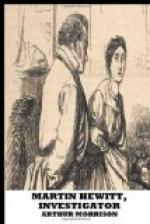“Certainly it is a considerable loss. Five thousand pounds——”
“Ah, but don’t misunderstand me! It isn’t the monetary value of the thing that I regret. As a matter of fact, I am indemnified for that already. Claridge has behaved most honorably—more than honorably. Indeed, the first intimation I had of the loss was a check from him for five thousand pounds, with a letter assuring me that the restoration to me of the amount I had paid was the least he could do to repair the result of what he called his unpardonable carelessness. Legally, I’m not sure that I could demand anything of him, unless I could prove very flagrant neglect indeed to guard against theft.”
“Then I take it, Lord Stanway,” Hewitt observed, “that you much prefer the cameo to the money?”
“Certainly. Else I should never have been willing to pay the money for the cameo. It was an enormous price—perhaps much above the market value, even for such a valuable thing—but I was particularly anxious that it should not go out of the country. Our public collections here are not so fortunate as they should be in the possession of the very finest examples of that class of work. In short, I had determined on the cameo, and, fortunately, happen to be able to carry out determinations of that sort without regarding an extra thousand pounds or so as an obstacle. So that, you see, what I want is not the value, but the thing itself. Indeed, I don’t think I can possibly keep the money Claridge has sent me; the affair is more his misfortune than his fault. But I shall say nothing about returning it for a little while; it may possibly have the effect of sharpening everybody in the search.”
“Just so. Do I understand that you would like me to look into the case independently, on your behalf?”
“Exactly. I want you, if you can, to approach the matter entirely from my point of view—your sole object being to find the cameo. Of course, if you happen on the thief as well, so much the better. Perhaps, after all, looking for the one is the same thing as looking for the other?”
“Not always; but usually it is, or course; even if they are not together, they certainly have been at one time, and to have one is a very long step toward having the other. Now, to begin with, is anybody suspected?”
“Well, the police are reserved, but I believe the fact is they’ve nothing to say. Claridge won’t admit that he suspects any one, though he believes that whoever it was must have watched him yesterday evening through the back window of his room, and must have seen him put the cameo away in his desk; because the thief would seem to have gone straight to the place. But I half fancy that, in his inner mind, he is inclined to suspect one of two people. You see, a robbery of this sort is different from others. That cameo would never be stolen, I imagine, with the view of its being sold—it is much too famous a thing; a man might as well walk




